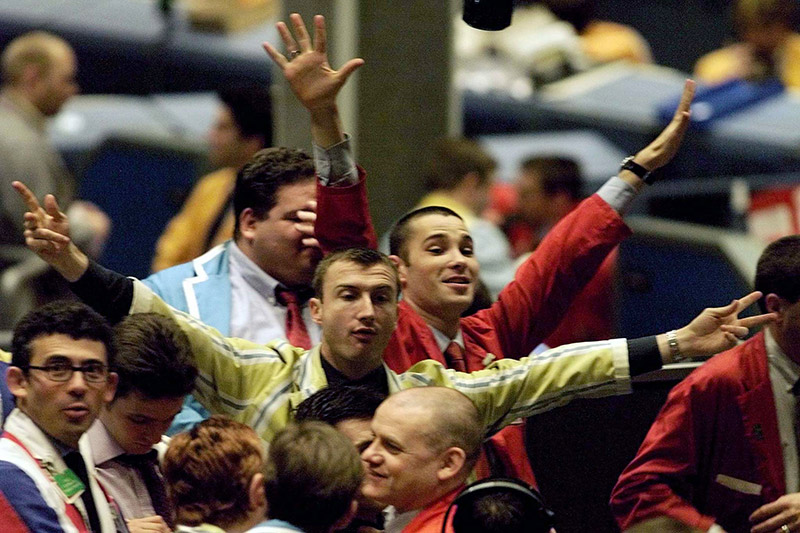By Steve Slater
LONDON (Reuters) - Europe's investment banks are giving Wall Street a run for its money despite shrinking their trading arms more aggressively than U.S. rivals.
Buoyant equity markets and a surge in corporate debt issues have caused a bigger-than-expected jump in investment bank fees in Europe helping Deutsche Bank (DE:DBKGn), UBS (VX:UBSN), Credit Suisse (VX:CSGN), Barclays (L:BARC), BNP Paribas (PA:BNPP) and Societe Generale (PA:SOGN) outperform their U.S. peers in the second quarter.
The six European lenders saw revenues from trading and selling debt grow 5 percent on average compared to a 9 percent combined drop at Goldman Sachs (N:GS), JP Morgan (N:JPM), Morgan Stanley (N:MS), Bank of America (N:BAC) and Citigroup (N:C).
Part of the outperformance was because in the previous year European banks were hit harder by the U.S. Federal Reserve's warning that it would gradually reduce its purchase of bonds.
But a surge in debt issuance by European companies this June, when European Central Bank President Mario Draghi cut interest rates to record lows, has also helped.
Grim warnings from the banks themselves had investors expecting falls in fixed-incomes revenue of up to a quarter in the April-June period but the reality proved less bleak after an upturn in activity at the tail end of the quarter.
"Expectations were it (Q2 performance) was going to be really, really bad, and in the end it just turned out to be quite bad," said David Moss, head of European equities at F&C Investments.
Faced with new regulations in the wake of the financial crisis that made debt trading more expensive, European investment banks have for the most part renounced their ambitions to be global players and cut their fixed-income divisions more aggressively than U.S. counterparts.
The retrenchment has in part been fuelled by public anger over their role in the financial crisis, prompting European politicians to impose tougher pay restrictions on traders and encouraging banks in the region to focus more on wealth management or retail and commercial banking.
The scale-back in investment banking means U.S. banks are expected to continue to dominate rankings, particularly if a rise in interest rates prompts a rebound in fixed income, with increased volatility and rising yield providing trading opportunities.
JP Morgan topped investment bank revenues in the first half of this year, with a 7.3 percent market share, according to Thomson Reuters data. It was followed by Bank of America and Goldman.
But all three lost market share, partly to European banks.
Deutsche Bank and Barclays were the top European firms in fifth and seventh, respectively, but both gained share despite Barclays being halfway through a radical scaling back of its investment banking division.
Barclays posted a 17 percent slide in revenues from debt sales and trading but, stripping out the impact of a strong pound, the decline was 8 percent in dollar terms.
Deutsche Bank, which is positioning itself as the only European full-service investment bank, said its strategy was working.
The bank, which is using part of the proceeds of an 8.5 billion euro capital increase to reinvest in its fixed-income trading arm, said it had achieved its best ever share in corporate finance and grabbed "significant" share in M&A revenues in the United States.
OUTLOOK STILL TOUGH
The European banks were helped by a jump of nearly 30 percent in investment bank fees in Europe in the first half of the year, outpacing a 6 percent rise in the Americas and a 12 percent global increase, according to Thomson Reuters data.
The fees were driven by buoyant equity markets encouraging European companies to raise cash and seal takeovers. Revenues from advisory and issuing equity and bonds for companies for Europe's top banks jumped 21 percent on average, outpacing a 14 percent rise at U.S. banks.
European and U.S. banks' equities revenues both fell about 15 percent from a year ago, according to Reuters data. In constant U.S. dollar terms, the European banks' out-performance was greater.
The brightest spots included near one-third jumps in advisory revenues at Barclays, UBS and SocGen and increases in fixed-income revenues at BNP Paribas and Credit Suisse.
Despite the second-quarter gains, the outlook remains tough, and investigations into alleged wrongdoing in foreign exchange markets and privately run stock markets could be costly.
Litigation concerns are depressing valuations, and Deutsche Bank and Barclays shares trade at only 0.6 times their book value - or the value of their assets - compared to an average of 1 times across European banks and the big U.S. banks.
Several banks also signalled the strong June did not continue in July, with Barclays cautioning that it was likely to be the slowest month of the year.
"The overwhelming issue for many investors is the fines, because they're unquantifiable," said F&C's Moss.
(Additional reporting by Simon Jessop; editing by Carmel Crimmins and Tom Pfeiffer)
